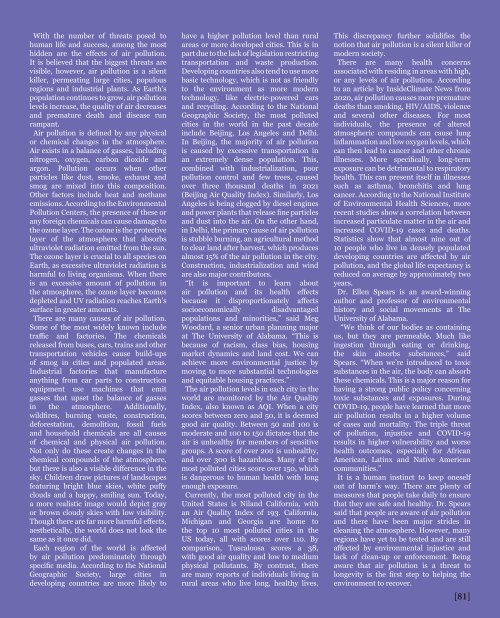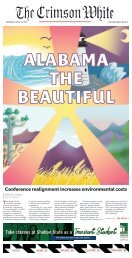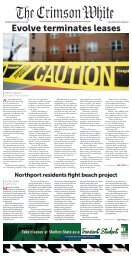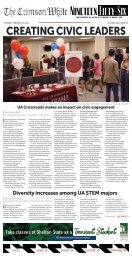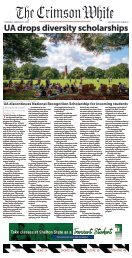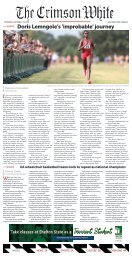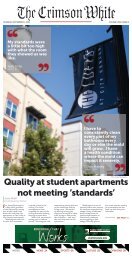Alice Vol. 7 No. 5
Volume 7 Issue 5 will renew your sense of vitality. Vitality is defined by the capacity to live, grow and develop, so we covered all our bases. We are obsessed with the award-winning drama “Pose” and the fashion surrounding ballroom culture, so we took a trip to the 70s in New York. No need to stress about your 21st birthday; we talked to students about how they spend milestone birthdays. We investigated the complex reality of pole dancing, illuminated Asian influence in media, analyzed child labor abuses in the beauty industry and talked with researchers about period poverty in the United States.
Volume 7 Issue 5 will renew your sense of vitality. Vitality is defined by the capacity to live, grow and develop, so we covered all our bases. We are obsessed with the award-winning drama “Pose” and the fashion surrounding ballroom culture, so we took a trip to the 70s in New York. No need to stress about your 21st birthday; we talked to students about how they spend milestone birthdays. We investigated the complex reality of pole dancing, illuminated Asian influence in media, analyzed child labor abuses in the beauty industry and talked with researchers about period poverty in the United States.
You also want an ePaper? Increase the reach of your titles
YUMPU automatically turns print PDFs into web optimized ePapers that Google loves.
With the number of threats posed to<br />
human life and success, among the most<br />
hidden are the effects of air pollution.<br />
It is believed that the biggest threats are<br />
visible, however, air pollution is a silent<br />
killer, permeating large cities, populous<br />
regions and industrial plants. As Earth’s<br />
population continues to grow, air pollution<br />
levels increase, the quality of air decreases<br />
and premature death and disease run<br />
rampant.<br />
Air pollution is defined by any physical<br />
or chemical changes in the atmosphere.<br />
Air exists in a balance of gasses, including<br />
nitrogen, oxygen, carbon dioxide and<br />
argon. Pollution occurs when other<br />
particles like dust, smoke, exhaust and<br />
smog are mixed into this composition.<br />
Other factors include heat and methane<br />
emissions. According to the Environmental<br />
Pollution Centers, the presence of these or<br />
any foreign chemicals can cause damage to<br />
the ozone layer. The ozone is the protective<br />
layer of the atmosphere that absorbs<br />
ultraviolet radiation emitted from the sun.<br />
The ozone layer is crucial to all species on<br />
Earth, as excessive ultraviolet radiation is<br />
harmful to living organisms. When there<br />
is an excessive amount of pollution in<br />
the atmosphere, the ozone layer becomes<br />
depleted and UV radiation reaches Earth’s<br />
surface in greater amounts.<br />
There are many causes of air pollution.<br />
Some of the most widely known include<br />
traffic and factories. The chemicals<br />
released from buses, cars, trains and other<br />
transportation vehicles cause build-ups<br />
of smog in cities and populated areas.<br />
Industrial factories that manufacture<br />
anything from car parts to construction<br />
equipment use machines that emit<br />
gasses that upset the balance of gasses<br />
in the atmosphere. Additionally,<br />
wildfires, burning waste, construction,<br />
deforestation, demolition, fossil fuels<br />
and household chemicals are all causes<br />
of chemical and physical air pollution.<br />
<strong>No</strong>t only do these create changes in the<br />
chemical compounds of the atmosphere,<br />
but there is also a visible difference in the<br />
sky. Children draw pictures of landscapes<br />
featuring bright blue skies, white puffy<br />
clouds and a happy, smiling sun. Today,<br />
a more realistic image would depict gray<br />
or brown cloudy skies with low visibility.<br />
Though there are far more harmful effects,<br />
aesthetically, the world does not look the<br />
same as it once did.<br />
Each region of the world is affected<br />
by air pollution predominately through<br />
specific media. According to the National<br />
Geographic Society, large cities in<br />
developing countries are more likely to<br />
have a higher pollution level than rural<br />
areas or more developed cities. This is in<br />
part due to the lack of legislation restricting<br />
transportation and waste production.<br />
Developing countries also tend to use more<br />
basic technology, which is not as friendly<br />
to the environment as more modern<br />
technology, like electric-powered cars<br />
and recycling. According to the National<br />
Geographic Society, the most polluted<br />
cities in the world in the past decade<br />
include Beijing, Los Angeles and Delhi.<br />
In Beijing, the majority of air pollution<br />
is caused by excessive transportation in<br />
an extremely dense population. This,<br />
combined with industrialization, poor<br />
pollution control and few trees, caused<br />
over three thousand deaths in 2021<br />
(Beijing Air Quality Index). Similarly, Los<br />
Angeles is being clogged by diesel engines<br />
and power plants that release fine particles<br />
and dust into the air. On the other hand,<br />
in Delhi, the primary cause of air pollution<br />
is stubble burning, an agricultural method<br />
to clear land after harvest, which produces<br />
almost 15% of the air pollution in the city.<br />
Construction, industrialization and wind<br />
are also major contributors.<br />
“It is important to learn about<br />
air pollution and its health effects<br />
because it disproportionately affects<br />
socioeconomically disadvantaged<br />
populations and minorities,” said Meg<br />
Woodard, a senior urban planning major<br />
at The University of Alabama. “This is<br />
because of racism, class bias, housing<br />
market dynamics and land cost. We can<br />
achieve more environmental justice by<br />
moving to more substantial technologies<br />
and equitable housing practices.”<br />
The air pollution levels in each city in the<br />
world are monitored by the Air Quality<br />
Index, also known as AQI. When a city<br />
scores between zero and 50, it is deemed<br />
good air quality. Between 50 and 100 is<br />
moderate and 100 to 150 dictates that the<br />
air is unhealthy for members of sensitive<br />
groups. A score of over 200 is unhealthy,<br />
and over 300 is hazardous. Many of the<br />
most polluted cities score over 150, which<br />
is dangerous to human health with long<br />
enough exposure.<br />
Currently, the most polluted city in the<br />
United States is Niland California, with<br />
an Air Quality Index of 193. California,<br />
Michigan and Georgia are home to<br />
the top 10 most polluted cities in the<br />
US today, all with scores over 110. By<br />
comparison, Tuscaloosa scores a 38,<br />
with good air quality and low to medium<br />
physical pollutants. By contrast, there<br />
are many reports of individuals living in<br />
rural areas who live long, healthy lives.<br />
This discrepancy further solidifies the<br />
notion that air pollution is a silent killer of<br />
modern society.<br />
There are many health concerns<br />
associated with residing in areas with high,<br />
or any levels of air pollution. According<br />
to an article by InsideClimate News from<br />
2020, air pollution causes more premature<br />
deaths than smoking, HIV/AIDS, violence<br />
and several other diseases. For most<br />
individuals, the presence of altered<br />
atmospheric compounds can cause lung<br />
inflammation and low oxygen levels, which<br />
can then lead to cancer and other chronic<br />
illnesses. More specifically, long-term<br />
exposure can be detrimental to respiratory<br />
health. This can present itself in illnesses<br />
such as asthma, bronchitis and lung<br />
cancer. According to the National Institute<br />
of Environmental Health Sciences, more<br />
recent studies show a correlation between<br />
increased particulate matter in the air and<br />
increased COVID-19 cases and deaths.<br />
Statistics show that almost nine out of<br />
10 people who live in densely populated<br />
developing countries are affected by air<br />
pollution, and the global life expectancy is<br />
reduced on average by approximately two<br />
years.<br />
Dr. Ellen Spears is an award-winning<br />
author and professor of environmental<br />
history and social movements at The<br />
University of Alabama.<br />
“We think of our bodies as containing<br />
us, but they are permeable. Much like<br />
ingestion through eating or drinking,<br />
the skin absorbs substances,” said<br />
Spears. “When we’re introduced to toxic<br />
substances in the air, the body can absorb<br />
these chemicals. This is a major reason for<br />
having a strong public policy concerning<br />
toxic substances and exposures. During<br />
COVID-19, people have learned that more<br />
air pollution results in a higher volume<br />
of cases and mortality. The triple threat<br />
of pollution, injustice and COVID-19<br />
results in higher vulnerability and worse<br />
health outcomes, especially for African<br />
American, Latinx and Native American<br />
communities.”<br />
It is a human instinct to keep oneself<br />
out of harm’s way. There are plenty of<br />
measures that people take daily to ensure<br />
that they are safe and healthy. Dr. Spears<br />
said that people are aware of air pollution<br />
and there have been major strides in<br />
cleaning the atmosphere. However, many<br />
regions have yet to be tested and are still<br />
affected by environmental injustice and<br />
lack of clean-up or enforcement. Being<br />
aware that air pollution is a threat to<br />
longevity is the first step to helping the<br />
environment to recover.<br />
[81]


